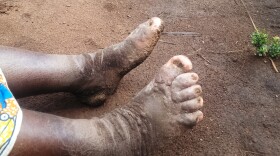
Michaeleen Doucleff
Michaeleen Doucleff, PhD, is a correspondent for NPR's Science Desk. For nearly a decade, she has been reporting for the radio and the web for NPR's global health outlet, Goats and Soda. Doucleff focuses on disease outbreaks, cross-cultural parenting, and women and children's health.
In 2014, Doucleff was part of the team that earned a George Foster Peabody award for its coverage of the Ebola outbreak in West Africa. For the series, Doucleff reported on how the epidemic ravaged maternal health and how the virus spreads through the air. In 2019, Doucleff and Senior Producer Jane Greenhalgh produced a story about how Inuit parents teach children to control their anger. That story was the most popular one on NPR.org for the year; altogether readers have spent more than 16 years worth of time reading it.
In 2021, Doucleff published a book, called Hunt, Gather, Parent, stemming from her reporting at NPR. That book became a New York Times bestseller.
Before coming to NPR in 2012, Doucleff was an editor at the journal Cell, where she wrote about the science behind pop culture. Doucleff has a bachelor degree in biology from Caltech, a doctorate in physical chemistry from the University of Berkeley, California, and a master's degree in viticulture and enology from the University of California, Davis.
-
The Centers for Disease Control has revised recommendations for treating ME/CFS and now says that vigorous exercise can make symptoms worse. Patient advocates say it's a huge victory.
-
Anthropologist James Suzman has lived with one of the last groups of hunter-gatherers. And it's made him rethink his perspective on the Western lifestyle.
-
According to a new report, semen can be a hotbed for viruses.
-
For the first time, scientists have carefully analyzed all the critters in a kitchen sponge. There turns out to be a huge number. Despite recent news reports, there is something you can do about it.
-
In the 2017 outbreak, the Chinese government reported 759 cases of the H7N9 avian flu, with 281 deaths. By comparison, in 2016 there were 123 cases.
-
It was a mystery: How did farmers in Uganda contract a nightmare illness? A researcher found the answer. What's the best way to help them?
-
Some species of bacteria in our intestines are disappearing. Can we reverse the microbial die-off? The food eaten by Tanzania's Hadza tribe could hold the answer.
-
NPR listeners had lots of questions after our story about diastasis recti, a medical condition of abdominal muscles that's common among new moms. Many wanted to know more about how to fix the problem.
-
Each year more than 600,000 babies die of sepsis. Researchers have found a simple way to prevent it: Feed babies probiotic bacteria that are common in kimchi, pickles and other fermented vegetables.
-
The technical term is diastasis recti, and it affects many new moms. The growing fetus pushes apart the abdominal muscles, and the separation often stays open. But science suggests this fix can work.










